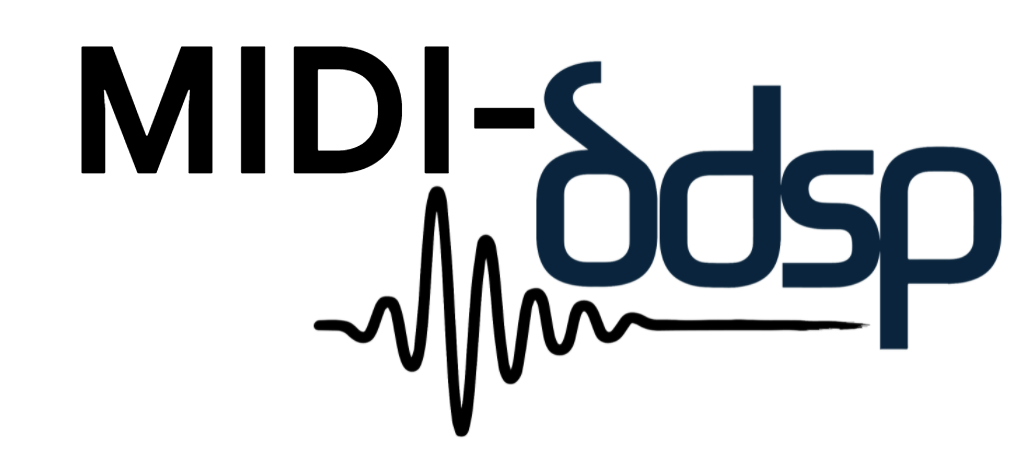MIDI-DDSP: Detailed Control of Musical Performance via Hierarchical Modeling
Demos | Blog Post | Colab Notebook | Paper |
MIDI-DDSP is a hierarchical audio generation model for synthesizing MIDI expanded from DDSP.
Links
- Check out the blog post
💻 - Read the original paper
📄 - Listen to some examples
🔈 - Try out MIDI Synthesis using MIDI-DDSP
🎵 ->🎻 🔊 - Try out Web Demo on Huggingface Spaces
🤗
Install MIDI-DDSP
You could install MIDI-DDSP via pip, which allows you to use the cool Command-line MIDI synthesis to synthesize your MIDI.
To install MIDI-DDSP via pip, simply run:
pip install midi-ddsp
Train MIDI-DDSP
To train MIDI-DDSP, please first install midi-ddsp and clone the MIDI-DDSP repository:
git clone https://github.com/magenta/midi-ddsp.git
For dataset, please download the tfrecord files for the URMP dataset in here to the data folder in your cloned repository using the following commands:
cd midi-ddsp # enter the project directory
mkdir ./data # create a data folder
gsutil cp gs://magentadata/datasets/urmp/urmp_20210324/* ./data # download tfrecords to directory
Please check here for how to install and use gsutil.
Finally, you can run the script train_midi_ddsp.sh to train the exact same model we used in the paper:
sh ./train_midi_ddsp.sh
The current codebase does not support training with arbitrary dataset, but we will hopefully update that in the near future.
Side note:
If one download the dataset to a different location, please change the data_dir parameter in train_midi_ddsp.sh.
The training of MIDI-DDSP takes approximately 18 hours on a single RTX 8000. The training code for now does not support multi-GPU training. We recommend using a GPU with more than 24G of memory when training Synthesis Generator in batch size of 16. For a GPU with less memory, please consider using a smaller batch size and change the batch size in train_midi_ddsp.sh.
Try to play with MIDI-DDSP yourself!
Please try out MIDI-DDSP in Colab notebooks!
In this notebook, you will try to use MIDI-DDSP to synthesis a monophonic MIDI file, adjust note expressions, make pitch bend by adjusting synthesis parameters, and synthesize quartet from Bach chorales.
We have trained MIDI-DDSP on the URMP dataset which support synthesizing 13 instruments: violin, viola, cello, double bass, flute, oboe, clarinet, saxophone, bassoon, trumpet, horn, trombone, tuba. You could find how to download and use our pre-trained model below:
Command-line MIDI synthesis
On can use the MIDI-DDSP as a command-line MIDI synthesizer just like FluidSynth.
To use command-line synthesis to synthesize a midi file, please first download the model weights by running:
midi_ddsp_download_model_weights
To synthesize a midi file simply run the following command:
midi_ddsp_synthesize --midi_path <path-to-midi>
For a starter, you can try to synthesize the example midi file in this repository:
midi_ddsp_synthesize --midi_path ./midi_example/ode_to_joy.mid
The command line also enables synthesize a folder of midi files. For more advance use (synthesize a folder, using FluidSynth for instruments not supported, etc.), please see synthesize_midi.py --help.
If you have a trouble downloading the model weights, please manually download from here, and specify the synthesis_generator_weight_path and expression_generator_weight_path by yourself when using the command line. You can also specify your other model weights if you want to use your own trained model.
Python Usage
After installing midi-ddsp, you could import midi-ddsp in python and synthesize MIDI in your code.
Minimal Example
Here is a simple example to use MIDI-DDSP to synthesize a midi file:
from midi_ddsp import synthesize_midi, load_pretrained_model
midi_file = 'ode_to_joy.mid'
# Load pre-trained model
synthesis_generator, expression_generator = load_pretrained_model()
# Synthesize MIDI
output = synthesize_midi(synthesis_generator, expression_generator, midi_file)
# The synthesized audio
synthesized_audio = output['mix_audio']
Advance Usage
Here is an advance example to synthesize the ode_to_joy.mid, change the note expression controls, and adjust the synthesis parameters:
import numpy as np
import tensorflow as tf
from midi_ddsp.utils.midi_synthesis_utils import synthesize_mono_midi, conditioning_df_to_audio
from midi_ddsp.utils.inference_utils import get_process_group
from midi_ddsp.midi_ddsp_synthesize import load_pretrained_model
from midi_ddsp.data_handling.instrument_name_utils import INST_NAME_TO_ID_DICT
# -----MIDI Synthesis-----
midi_file = 'ode_to_joy.mid'
# Load pre-trained model
synthesis_generator, expression_generator = load_pretrained_model()
# Synthesize with violin:
instrument_name = 'violin'
instrument_id = INST_NAME_TO_ID_DICT[instrument_name]
# Run model prediction
midi_audio, midi_control_params, midi_synth_params, conditioning_df = synthesize_mono_midi(synthesis_generator,
expression_generator,
midi_file, instrument_id,
output_dir=None)
synthesized_audio = midi_audio # The synthesized audio
# -----Adjust note expression controls and re-synthesize-----
# Make all notes weak vibrato:
conditioning_df_changed = conditioning_df.copy()
note_vibrato = conditioning_df_changed['vibrato_extend'].value
conditioning_df_changed['vibrato_extend'] = np.ones_like(conditioning_df['vibrato_extend'].values) * 0.1
# Re-synthesize
midi_audio_changed, midi_control_params_changed, midi_synth_params_changed = conditioning_df_to_audio(
synthesis_generator, conditioning_df_changed, tf.constant([instrument_id]))
synthesized_audio_changed = midi_audio_changed # The synthesized audio
# There are 6 note expression controls in conditioning_df that you could change:
# 'amplitude_mean', 'amplitude_std', 'vibrato_extend', 'brightness', 'attack_level', 'amplitudes_max_pos'.
# Please refer to https://colab.research.google.com/github/magenta/midi-ddsp/blob/main/midi_ddsp/colab/MIDI_DDSP_Demo.ipynb#scrollTo=XfPPrdPu5sSy for the effect of each control.
# -----Adjust synthesis parameters and re-synthesize-----
# The original synthesis parameters:
f0_ori = midi_synth_params['f0_hz']
amps_ori = midi_synth_params['amplitudes']
noise_ori = midi_synth_params['noise_magnitudes']
hd_ori = midi_synth_params['harmonic_distribution']
# TODO: make your change of the synthesis parameters here:
f0_changed = f0_ori
amps_changed = amps_ori
noise_changed = noise_ori
hd_changed = hd_ori
# Resynthesis the audio using DDSP
processor_group = get_process_group(midi_synth_params['amplitudes'].shape[1], use_angular_cumsum=True)
midi_audio_changed = processor_group({'amplitudes': amps_changed,
'harmonic_distribution': hd_changed,
'noise_magnitudes': noise_changed,
'f0_hz': f0_changed, },
verbose=False)
midi_audio_changed = synthesis_generator.reverb_module(midi_audio_changed, reverb_number=instrument_id, training=False)
synthesized_audio_changed = midi_audio_changed # The synthesized audio


